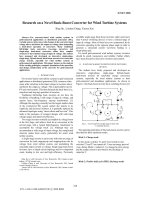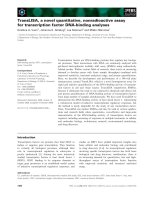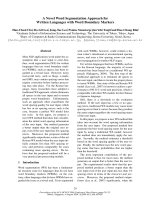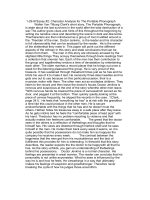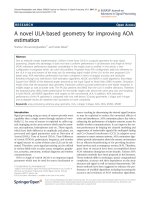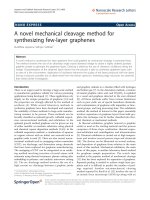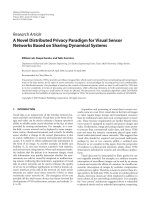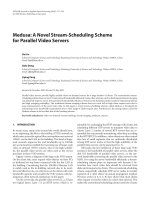A novel sufficient schedulability analysis for for floating defer preemption
Bạn đang xem bản rút gọn của tài liệu. Xem và tải ngay bản đầy đủ của tài liệu tại đây (420.61 KB, 13 trang )
A novel sufficient schedulability analysis
for for floating defer preemption
1
Supervisor: Dr. Nguyen Thi Huyen Chau
Student
: Vo Anh Hung
Outline
2
1. Overview
1. Studied problem
2. Background knowledge
2. Contributions
1. The inexactitudes in [2].
2. Corrected schedulability test.
3. Novel sufficient schedulability test.
3. Conclusion and perspective
3
What is a real-time system?
o A computing system that processes information
and produces output within precise time
constraints.
o Quality of these systems depends on the validity
of the output and the moment this result is
produced.
Importance of the schedulability tests.
Basic notions
4
o Constrained deadline: The
𝑛: number of tasks.
deadline of any task
o 𝜏𝑖 : The 𝑖 𝑡ℎ task, each task
smaller than the period.
can perform infinite times
(job 𝜏𝑖,𝑘 ).
o Arbitrary deadline: The
deadline of any task may
o Each task 𝜏𝑖 consists of
be greater than the
three basic parameters:
period.
o 𝐶𝑖 : the worst-case
execution time
o 𝑇𝑖 : period
o 𝐷𝑖 : relative deadline
o
Scheduling policies
5
o Fixed priority scheduling: among ready
tasks, CPU will be assigned to the highest
priority one.
Preemptive
Non-Preemptive
Non-Preemptive
Regions
𝑞𝑖
6
Principle of schedulability analysis
o Schedulability verification: only sufficient or exact
tests.
o Principle: Always test the system in the worst-case
scenario.
o If passes the test, the system is schedulable.
o Otherwise, the system is unschedulable.
o Critical instant: The system phase that produces the
longest task response time.
Critical instant is an important factor to verify the
schedulability in case that the system phase in unknown.
7
Critical instant in [2] - revisited
o The critical instant for P, NP (1):
o Simultaneously released with all of its higher
priority tasks.
o Experiences its largest blocking time.
o [2] has claimed that (1) also defines the critical
instants for NPR tasks.
o The thesis has proved that this statement is not
correct by a counter-example.
8
Critical instant in [2]– counter-example
Task
C
1
2
D
T
q
4
8
0
6
15
5
When 𝜙1 = 𝜙2 , 𝑅2 = 10
When 𝜙1 − 𝜙2 ↓ 0, 𝑅2 = 14
9
Schedulability test in [2] - revisited
o [2] has claimed that:
A task set 𝜏 with floating non-preemptive regions is
schedulable with a fixed priority algorithm if and only if ∀𝜏𝑖 ∈
𝜏, ∃𝑡 ∈ 𝑇𝑆(𝜏𝑖 ) such that:
𝑊𝑖 (𝑡) + 𝐵𝑖 ≤ 𝑡
o The thesis has proved this to be incorrect by a counterexample.
o The corrected test:
A task set 𝜏 with floating non-preemptive regions is
schedulable with a fixed priority algorithm if ∀𝜏𝑖 ∈ 𝜏, ∃𝑡 ∈
𝑇𝑆(𝜏𝑖 ) such that:
𝑊𝑖 (𝑡) + 𝐵𝑖 ≤ 𝑡
10
A novel sufficient schedulability test
for NPR with arbitrary deadlines
o Extend the corrected test for arbitrary deadlines:
Theorem: A task set 𝑇 with non-preemptive regions and
aribitrary deadlines is schedulable if:
∀𝑡𝑖 ∈ 𝑇, ∀𝑘 ∈ 𝑁: 0 < 𝑘 ≤ 𝑙𝑖 , ∃𝑡 ∈ 𝑆𝑖,𝑘 :
𝑊𝑖,𝑘 𝑡 + 𝐵𝑖 ≤ 𝑡
Where:
𝑆𝑖,𝑘
𝑘 − 1 𝑇𝑖
𝑘 − 1 𝑇𝑖 + 𝐷𝑖
= 𝑎𝑇𝑗 𝑗 < 𝑖,
<𝑎≤
}
𝑇𝑗
𝑇𝑗
𝑊𝑖,𝑘 𝑡 = 𝑘𝐶𝑖 +
𝑅𝐹𝐵𝑗 (𝑡)
𝑗<𝑖
11
Conclusion and perspective
o Conclusion:
o Present some inexactitudes in [2].
o Correct the schedulability test in [2].
o Propose a novel sufficient schedulability test for
a more general context.
o Perspective:
o Will refine all the other results in [2].
o Will characterize the critical instant to propose a
necessary and sufficient condition for verifying
the system schedulability in NPR.
References
12
1.
[1] R. Bril, J. Lukkien, and W. Verhaegh. Worst-case response
time analysis of realtime tasks under fixed-priority scheduling
with deferred preemption. Real-Time Systems, 42(1-3):63–119,
2009.
2.
[2] G. Yao, G. Buttazzo, and M. Bertogna. Bounding the
maximum length of nonpreemptive regions under fixed priority
scheduling. In Proceeding of the 16th IEEE international
conference on embedded and Real-Time Computing Systems
and Applications(RTCSA 2009), pages 351–360, China, 2009.
3.
[3] G. C. Buttazzo. Hard Real-Time Computing Systems:
Predictable Scheduling Algorithms and Applications. Springer,
2006.
13
Thank you for your attending
